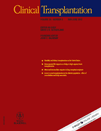
CLINICAL TRANSPLANTATION
Scope & Guideline
Empowering the Global Transplantation Community
Introduction
Aims and Scopes
- Clinical Outcomes and Graft Survival:
Research focused on the outcomes of various transplantation procedures, including factors that affect graft survival and patient mortality rates post-transplant. - Immunosuppression Strategies:
Studies exploring different immunosuppressive regimens, their efficacy, safety, and long-term impacts on transplant recipients. - Transplantation Techniques and Innovations:
Innovative surgical techniques and advancements in transplantation practices, including the use of machine perfusion and minimally invasive approaches. - Patient-Centric Research:
Research that addresses patient experiences, psychosocial factors, and quality of life issues for transplant recipients. - Infectious Disease Management:
Focus on the management and prevention of infections in transplant patients, particularly concerning viral infections like CMV and COVID-19. - Ethical and Policy Issues:
Discussions surrounding the ethical considerations and policies impacting organ donation and transplantation practices.
Trending and Emerging
- Impact of COVID-19 on Transplantation:
Research exploring the implications of COVID-19 on transplant outcomes, including vaccination responses and management of infected transplant recipients. - Telemedicine and Remote Patient Monitoring:
Increased interest in telehealth solutions for post-transplant care and patient monitoring, reflecting a shift towards more accessible healthcare delivery. - Multidisciplinary Approaches to Transplant Care:
A growing trend towards collaborative care models that integrate various specialties in the management of transplant patients. - Ethnic and Racial Disparities in Transplant Access:
Research addressing disparities in organ transplantation access and outcomes among different racial and ethnic groups, highlighting the need for equitable healthcare. - Innovative Biomarkers for Rejection and Graft Function:
Emerging studies focusing on the development and validation of non-invasive biomarkers for monitoring graft health and rejection. - Psychosocial Factors in Transplant Outcomes:
Increasing emphasis on the psychosocial aspects of transplantation, including mental health, social support, and their impact on graft success.
Declining or Waning
- Basic Science of Transplant Immunology:
Research specifically centered on the fundamental immunological mechanisms governing transplant rejection has seen a decline as clinical applications and patient outcomes take precedence. - Longitudinal Studies on Older Transplant Recipients:
There has been a reduction in studies focusing solely on the long-term outcomes of elderly transplant recipients as the field shifts towards a more holistic approach to patient care. - Pediatric Transplantation Research:
While still important, the volume of research specifically targeting pediatric transplantation has decreased, possibly due to a greater emphasis on adult transplant studies and outcomes. - Transplantation in Rare Diseases:
Research focusing on transplantation outcomes in rare or less common diseases seems to be waning as more prevalent conditions dominate the research landscape.
Similar Journals
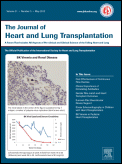
JOURNAL OF HEART AND LUNG TRANSPLANTATION
Advancing the Frontiers of Heart and Lung ScienceJOURNAL OF HEART AND LUNG TRANSPLANTATION, published by Elsevier Science Inc., serves as a premier platform for researchers and clinicians in the fields of Cardiology, Cardiovascular Medicine, Pulmonary and Respiratory Medicine, Surgery, and Transplantation. Since its inception in 1991, this esteemed journal has maintained a robust impact within the scientific community, currently holding a remarkable Q1 ranking in multiple categories as of 2023, indicative of its influential contributions to the field. With Scopus rankings placing it among the top ten in Surgery and fourth in Transplantation, it is essential reading for those looking to stay at the forefront of innovative transplantation techniques and cardiovascular research. Although not an open access journal, its rich content is crucial for advancing knowledge and promoting best practices, making it indispensable for professionals, students, and researchers dedicated to the life-saving field of heart and lung transplantation. The journal continues to foster academic excellence and facilitate impactful research, addressing contemporary challenges and innovations within these critical areas.
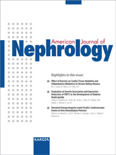
AMERICAN JOURNAL OF NEPHROLOGY
Pioneering insights in kidney disease management.The American Journal of Nephrology, published by KARGER, stands as a prestigious platform for the dissemination of high-quality research in the field of nephrology, boasting an impressive Q1 ranking in its category as of 2023. With its ISSN 0250-8095 and E-ISSN 1421-9670, the journal has been committed to advancing knowledge in kidney diseases since its inception in 1981. It serves as an essential resource for researchers, clinicians, and students alike, featuring original articles, reviews, and case reports that contribute to the understanding and treatment of renal conditions. Despite not being an open-access journal, the American Journal of Nephrology ensures a rigorous peer-review process to maintain its high academic standards, making it a vital source of information for the nephrology community worldwide. By providing insights into emerging trends and breakthroughs in kidney health, the journal continues to play a crucial role in shaping the future of nephrology research.

Experimental and Clinical Transplantation
Enhancing Patient Care Through Groundbreaking ResearchExperimental and Clinical Transplantation is a distinguished journal published by Baskent University in Turkey, dedicated to advancing the field of transplantation through innovative research and clinical insights. Established in 2003, the journal has rapidly gained recognition within the academic community, currently holding a Q3 ranking in the field of Transplantation for 2023, as evidenced by its position in the Scopus ranking for the discipline. With an emphasis on both experimental and clinical studies, this journal serves as a crucial platform for sharing breakthroughs in transplant medicine, immunology, and post-operative care strategies. Although it operates under a restricted access policy, the journal seeks to bridge the gap between research findings and practical applications in clinical settings, making it invaluable for researchers, healthcare professionals, and students alike who are keen on exploring advancements in the transplantation landscape. Through its commitment to quality and innovation, Experimental and Clinical Transplantation contributes significantly to enhancing patient outcomes and fostering scholarly dialogue in the transplantation community.

International Journal of Organ Transplantation Medicine
Unlocking the Future of Organ Transplantation MedicineThe International Journal of Organ Transplantation Medicine, published by the Avicenna Organ Transplant Center, stands as a vital resource for the field of transplantation medicine. Established to advance scientific knowledge and clinical practices, this open access journal has been supporting the global research community since 2010, ensuring that groundbreaking findings are easily accessible to researchers, professionals, and students alike. With its ISSN of 2008-6490 and E-ISSN 2008-6482, the journal consistently showcases high-quality, peer-reviewed articles, addressing critical advancements in transplantation techniques, patient care, and immunology. Renowned for its commitment to excellence, it holds a Q3 ranking in transplantation for 2023 and ranks #32 out of 54 in the Scopus medicine transplantation category, placing it in the 41st percentile. Researchers are encouraged to submit their work, contributing to the journal's goal of improving outcomes in organ transplantation and fostering collaboration across disciplines.
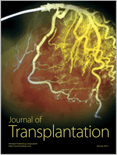
Journal of Transplantation
Elevating Patient Care Through Cutting-edge ResearchThe Journal of Transplantation is a leading peer-reviewed journal published by HINDAWI LTD, dedicated to advancing the field of organ transplantation and associated medical research. Since its inception in 2009 as an Open Access journal, it has provided a vital platform for researchers, clinicians, and students to share innovative findings and developments in transplantation science. With an emphasis on high-quality research, the journal aims to publish original articles, reviews, and case studies that contribute to the understanding of immunology, surgical techniques, and postoperative care, thereby enhancing patient outcomes. The journal is committed to fostering a collaborative scientific community and making valuable research freely accessible to professionals worldwide, ensuring that it remains at the forefront of transplantation studies. This journal serves as an essential resource for anyone looking to stay updated on the latest advancements and clinical practices in the field.

Transplant Infectious Disease
Empowering researchers to tackle transplant-related infections with cutting-edge insights.Transplant Infectious Disease is a premier journal dedicated to advancing the understanding of infectious complications in transplant recipients, contributing significantly to the fields of Infectious Diseases and Transplantation. Published by Wiley in the United Kingdom, this journal boasts an impressive reputation within the academic community, holding a 2023 Q2 quartile ranking in both Infectious Diseases and Transplantation, as well as notable Scopus rankings that position it among the top tiers of its categories. With a convergence of scholarly articles and research findings from 1999 through 2024, Transplant Infectious Disease serves as a critical resource for researchers, professionals, and students seeking to explore the intersection of transplantation and infectious diseases. The journal encourages open dialogue and knowledge dissemination through rigorous peer-reviewed content, making it an essential platform for those aiming to address the challenges and innovations in transplant medicine.
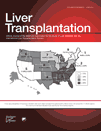
LIVER TRANSPLANTATION
Advancing the Future of Liver Health.LIVER TRANSPLANTATION, published by Lippincott Williams & Wilkins, stands at the forefront of hepatology and transplantation research, with a prestigious Q1 rating across the categories of Hepatology, Surgery, and Transplantation as of 2023. Since its inception in 2000, this journal has been dedicated to disseminating high-quality, cutting-edge research that advances the understanding and practice of liver transplantation. With an impressive ranking of 23rd out of 551 in Surgery and 9th out of 54 in Transplantation, it occupies an esteemed position in the academic landscape, attracting contributions from leading experts in the field. The journal's rigorous peer-review process ensures the publication of impactful studies, innovative clinical practices, and vital insights into patient management. By fostering a collaborative environment for researchers, clinicians, and students alike, LIVER TRANSPLANTATION serves as an essential resource for those engaged in the complexities of liver transplantation and related fields. Join the community committed to advancing liver health and transplantation science.

Transplantation Direct
Fostering Global Insights in Transplantation MedicineTransplantation Direct is a leading open access journal in the field of transplantation, published by the prestigious Lippincott Williams & Wilkins. Since its inception in 2015, the journal has provided a vital platform for the dissemination of high-quality research and advancements related to organ transplantation. With an impact factor that places it in the Q2 category among transplantation journals, it ranks #22 out of 54 in the Medicine - Transplantation Scopus classification, reflecting its significance and authority within the discipline. The journal not only covers a broad scope of topics related to transplantation but also encourages global collaboration and knowledge exchange amongst researchers, clinicians, and students. With its open access model, Transplantation Direct ensures that groundbreaking findings are accessible to a wider audience, fostering innovation and enhancing patient care worldwide. For more information, visit their address at TWO COMMERCE SQ, 2001 MARKET ST, PHILADELPHIA, PA 19103.

Turkish Journal of Nephrology
Fostering knowledge exchange in nephrology and surgery.Turkish Journal of Nephrology, published by AVES, serves as a pivotal platform for disseminating significant research in the domains of nephrology, transplantation, and surgery. Since its establishment as an Open Access journal in 2019, it has gained traction for delivering high-quality, peer-reviewed articles that reflect the latest advancements and practices in these critical medical fields. Based in Turkey, this journal has rapidly become an important resource, particularly for researchers and healthcare professionals striving to enhance kidney healthcare strategies. Despite being categorized in the fourth quartile across its main categories for 2023 and having modest rankings within Scopus, its commitment to openness and accessibility fosters a collaborative academic environment that promotes knowledge sharing. We encourage scholars, practitioners, and students to engage with the journal's content to further drive innovation and improve patient outcomes in nephrology and associated disciplines.
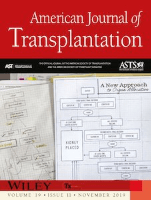
AMERICAN JOURNAL OF TRANSPLANTATION
Shaping the future of transplantation with impactful findings.American Journal of Transplantation, published by Elsevier Science Inc, is a premier academic journal dedicated to the critical field of transplantation. With an impressive impact factor and prestigious rankings in Immunology and Allergy, Pharmacology (medical), and Transplantation, it stands as a leading source of high-quality research in these domains, boasting a Q1 category status since 2023. The journal serves an essential role in advancing scientific knowledge and clinical practices, publishing cutting-edge studies that address pressing issues in organ transplantation and immunology. Researchers, healthcare professionals, and students will find valuable insights through rigorous peer-reviewed articles that focus on innovative methodologies, outcomes, and the latest developments within transplantation science. As the journal continues to evolve from its inception in 2001 to its ongoing contributions through 2024, it remains a key resource for those looking to stay at the forefront of transplantation research and practice.